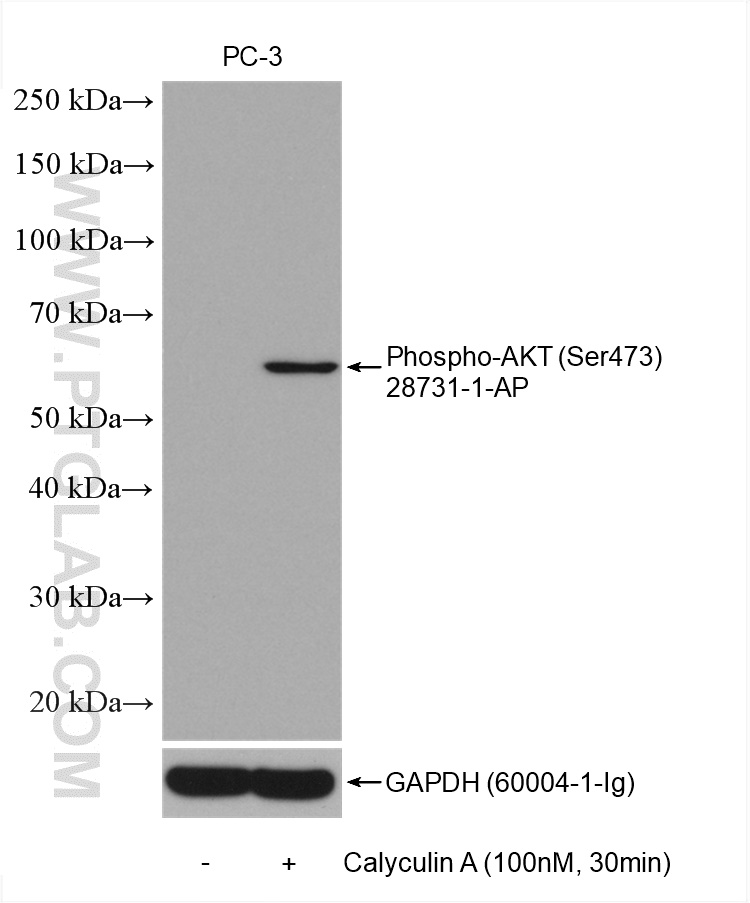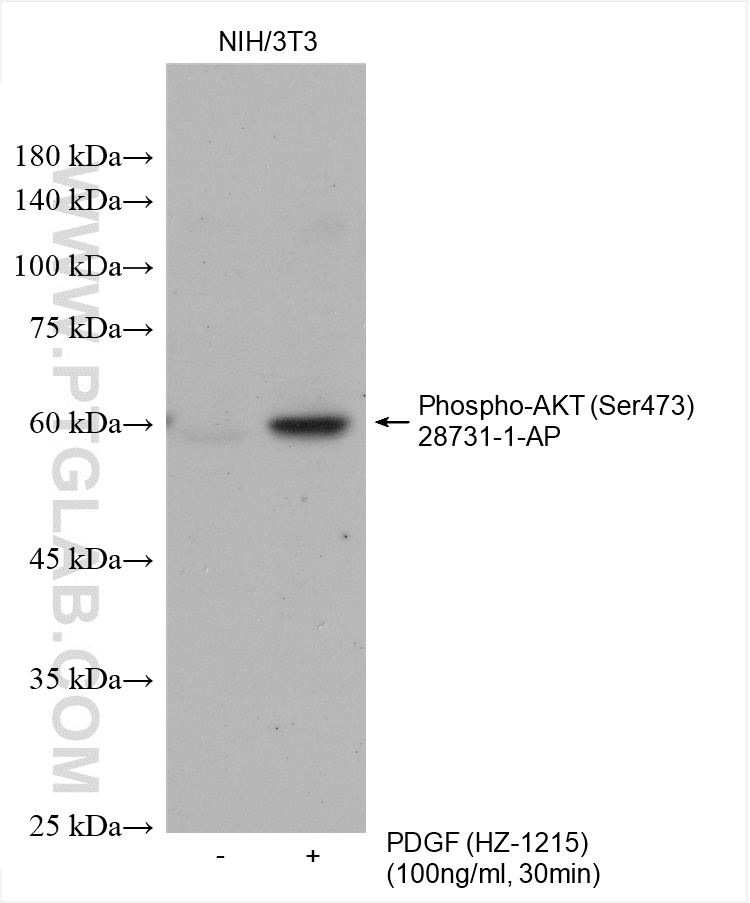验证数据展示
经过测试的应用
| Positive WB detected in | Calyculin A treated PC-3 cells, PDGF treated NIH/3T3 cells |
推荐稀释比
| 应用 | 推荐稀释比 |
|---|---|
| Western Blot (WB) | WB : 1:1000-1:5000 |
| It is recommended that this reagent should be titrated in each testing system to obtain optimal results. | |
| Sample-dependent, Check data in validation data gallery. | |
产品信息
28731-1-AP targets Phospho-AKT (Ser473) in WB, IHC, IF, ELISA applications and shows reactivity with human, mouse, rat samples.
| 经测试应用 | WB, ELISA Application Description |
| 文献引用应用 | WB, IHC, IF |
| 经测试反应性 | human, mouse, rat |
| 文献引用反应性 | human, mouse, rat, pig, rabbit, sheep |
| 免疫原 | Peptide 种属同源性预测 |
| 宿主/亚型 | Rabbit / IgG |
| 抗体类别 | Polyclonal |
| 产品类型 | Antibody |
| 全称 | v-akt murine thymoma viral oncogene homolog 1 |
| 别名 | AKT (Ser473), p AKT, p AKT (Ser473), p-AKT, p-AKT (Ser473) |
| 观测分子量 | 58 kDa |
| GenBank蛋白编号 | NM_005163 |
| 基因名称 | AKT1 |
| Gene ID (NCBI) | 207 |
| RRID | AB_2881201 |
| 偶联类型 | Unconjugated |
| 形式 | Liquid |
| 纯化方式 | Antigen affinity purification |
| UNIPROT ID | P31749 |
| 储存缓冲液 | PBS with 0.02% sodium azide and 50% glycerol, pH 7.3. |
| 储存条件 | Store at -20°C. Stable for one year after shipment. Aliquoting is unnecessary for -20oC storage. |
背景介绍
Phosphorylation on Thr-308, Ser-473 and Tyr-474 is required for full activity. Activated TNK2 phosphorylates it on Tyr-176 resulting in its binding to the anionic plasma membrane phospholipid PA (PubMed:20333297). This phosphorylated form localizes to the cell membrane, where it is targeted by PDPK1 and PDPK2 for further phosphorylations on Thr-308 and Ser-473 leading to its activation (PubMed:9512493). Ser-473 phosphorylation by mTORC2 favors Thr-308 phosphorylation by PDPK1 (PubMed:21464307, PubMed:8978681). AKT1 Thr-308 and Ser-473 is Phosphorylated by IKBKE and TBK1 (PubMed:15718470, PubMed:18456494, PubMed:20481595, PubMed:8978681). Ser-473 phosphorylation is enhanced by interaction with AGAP2 isoform 2 (PIKE-A) (PubMed:14761976). Ser-473 phosphorylation is enhanced in focal cortical dysplasias with Taylor-type balloon cells (PubMed:17013611). Ser-473 phosphorylation is enhanced by signaling through activated FLT3 (By similarity). Ser-473 is dephosphorylated by PHLPP (PubMed:28147277) and Ser-473 by PP2A phosphatase (PubMed:21329884).
实验方案
| Product Specific Protocols | |
|---|---|
| WB protocol for Phospho-AKT (Ser473) antibody 28731-1-AP | Download protocol |
| Standard Protocols | |
|---|---|
| Click here to view our Standard Protocols |
发表文章
| Species | Application | Title |
|---|---|---|
Toxicology Toxicity mechanism of peri-implantation pesticide beta-cypermethrin exposure on endometrial remodeling in early pregnant mice | ||
J Neuroinflammation TREM2 affects DAM-like cell transformation in the acute phase of TBI in mice by regulating microglial glycolysis | ||
Phytomedicine Combinational application of the natural products 1-deoxynojirimycin and morin ameliorates insulin resistance and lipid accumulation in prediabetic mice | ||
Biomed Pharmacother Preclinical characterization of danatinib as a novel FLT3 inhibitor with excellent efficacy against resistant acute myeloid leukemia | ||
Cell Biosci Serine protease PRSS56, a novel cancer-testis antigen activated by DNA hypomethylation, promotes colorectal and gastric cancer progression via PI3K/AKT axis | ||
Biomed Pharmacother Cinnamaldehyde protects donor heart from cold ischemia-reperfusion injury via the PI3K/AKT/mTOR pathway |

